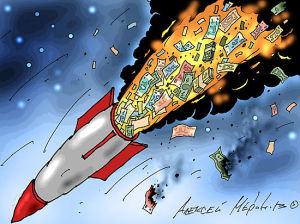
On April 12, 1961 the first man — a Soviet astronaut named Yuri Gagarin — conquered space. Since that date the Soviet Union, and then the Russian Federation, has been proudly calling itself a “space power.” Whatever the gap in industry, medicine, or living conditions between it and the leading countries of the West, the Soviet government has insisted that there is no one as good in the space industry as the Soviet Union. It seems that today’s Kremlin has the same opinion.
However, after the collapse of the Soviet Union in 1991 the proud explorers of space began to have serious problems. The world’s largest cosmodrome, “Baikonur”, is now located not in Russian territory but abroad — in Kazakhstan. As a result, expenses have increased: Russia pays $116 million a year to rent the cosmodrome. It allocates more than a billion rubles to the city of Baikonur. In 2012, the total cost of keeping the cosmodrome consumed 4.2% of the budget of the Russian Federal Space Agency. Meanwhile, Russia has to put up with the fact that one of its most important strategic facilities is located abroad, creating political risks.
Another Russian cosmodrome, “Plesetsk”, is located in the Arkhangelsk region. It has been the property of the military since Soviet times, although for the past few years it has been used for commercial launches too. However, Plesetsk is located in the far north which makes it much less effective for peaceful uses. A spaceport shall be located closer to the equator to make it easier and cheaper to run a spacecraft.
Construction of a new Russian cosmodrome is long overdue. On November 6, 2007, Putin signed a decree authorizing construction of the cosmodrome “Vostochny” (“Eastern Spaceport”) in the Amur region. After many delays, the first stone was laid in 2010, the engineering started in 2011, and in November 2012 construction of the launch facility and the foundation were begun. But before this important state facility was built, it was found to be a center of a series of high-profile corruption scandals. Finding a variety of violations, the Prosecutor General’s Office of the Russian Federation initiated 20 criminal proceedings and sent 600 pages of materials to the court. In the spring of 2015 the builders of “Vostochny” were not paid and the prosecutors had to open a temporary office at the construction zone. Tatyana Golikova, chairwoman of the Audit Chamber of the Russian Federation, mentioned that the cost of building the “Vostochny” above ground infrastructure was overestimated by … 13 billion rubles. Golikova said that she had always been struck by how ineffectively money is used in the construction business in Russia. One can only guess how much the estimates were inflated and how much was stolen during construction of the underground infrastructure of the “Vostochny”.
 The rocket launches have also not been going smoothly in recent years. More than a dozen “space failures” took place from 2010 to 2015, causing $20 billion damage to the country’s budget. In April and May 2015 two accidents took place. The first happened with a cargo spacecraft, “Progress,” which was heading to the International Space Station. The second happened to a carrier rocket called “Proton” which had a Mexican communication satellite on board.
The rocket launches have also not been going smoothly in recent years. More than a dozen “space failures” took place from 2010 to 2015, causing $20 billion damage to the country’s budget. In April and May 2015 two accidents took place. The first happened with a cargo spacecraft, “Progress,” which was heading to the International Space Station. The second happened to a carrier rocket called “Proton” which had a Mexican communication satellite on board.
The authorities’ response to the crises in the space sector indicates political hysteria, which has swept the country and is close to madness. Deputy Prime Minister Rogozin is responsible for the space sector and has said that the frequent accidents are caused by “moral decay of the management of the space industry“. Some people believe in bad signs: that the “Progress” accident happened because it was loaded with spiritual objects such as paintings of Shilov (2011) and military symbols such as “Victory Banner” (2015). Some people talk about diversion and sabotage: Duma deputies want the “state security apparatus” to be involved in the space industry on all levels. The renowned crime fighter deputy Alexander Khinshtein introduced a bill to authorize use of prison labor in factories and construction sites. A few more mad fantasies, and somewhere in Siberia they will start building a cosmic Gulag.





